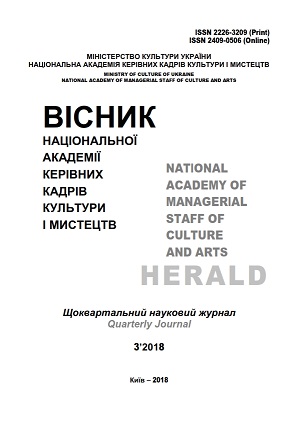Dialogue of Cultures: E. Hall and F. Kluckhohn
Dialogue of Cultures: E. Hall and F. Kluckhohn
Author(s): Lidiia Vasylivna Shynkaruk, Halyna Vladymyrovna Salata, Tetiana Viktorivna DanylovaSubject(s): Social Philosophy, Culture and social structure , Theory of Communication, Social Theory, Sociology of Culture
Published by: Національна академія керівних кадрів культури і мистецтв
Keywords: culture; communication; intercultural communication; intercultural dialogue; E. Hall; high-context and low-context cultures; monochronic and polychronic cultures;
Summary/Abstract: The purpose of the study. This paper aims at highlighting some of the main approaches to intercultural dialogue – E. Hall’s cultural factors and F. Kluckhohn and F. Strodtbeck’s value orientations theory. Methodology. The authors have used anthropological integrative approach, comparative analysis, and philosophical hermeneutics. The scientific novelty. Cultural patterns are largely determined by different reality tunnels: everyone creates his/her own unique reality, which is recognized as the only one “true reality”. This makes communication more complicated. Nowadays, global awareness and understanding of other cultures help people to cope with the “difficulties of cultural translation”. To avoid the threats to effective intercultural communication, we must recognize that Other doesn’t mean Wrong, Other is just Different. It helps to understand the cultural logics behind cultural differences. One-sided perception caused by cultural and historical differences can be overcome by integrating the other models of thinking, as well as by accepting the other “rules” of relations between people, including those, which have arisen under other cultural and historical conditions. This will lead to recognition that different cultural systems do not exclude, but successfully complement and enrich each other. Conclusions. Hall’s theory of culture and F. Kluckhohn and F. Strodtbeck’s value orientation theory contribute to better understanding of the representatives of other cultures, their attitudes towards the world and ways of communication, as well as promote the ability to be a successful intercultural dialogue’s participant.
Journal: Вісник Національної академії керівних кадрів культури і мистецтв
- Issue Year: 2018
- Issue No: 3
- Page Range: 128-133
- Page Count: 6
- Language: English

